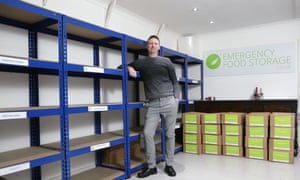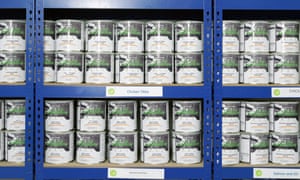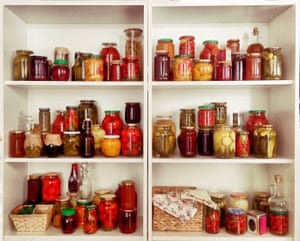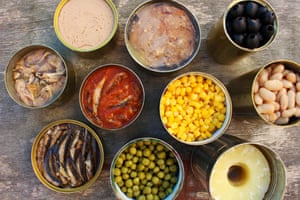https://www.theguardian.com/world/2...alypse-coronavirus-stockpilers-emergency-food
How Britain became a nation of stockpilers: 'It just feels like something is going to give'
Coronavirus outbreak
First there were Brexit hoarders, now it’s coronavirus preppers.Sirin Kale talks to some of them – and to the emergency food supplier who is enjoying a boom time
Sirin Kale
Mon 24 Feb 2020 11.00 GMT Last modified on Wed 18 Mar 2020 10.58 GMT

James Blake and empty shelves at his Emergency Food Storage UK. Photograph: Gary Calton/The Guardian
James Blake, the owner of Europe’s largest emergency food supplier, is one of the few people to be doing good business out of coronavirus. Are you planning to hole up indoors while a pandemic, natural disaster or terrorist attack runs its course? Blake’s company – Emergency Food Storage UK – has got you covered, but it’s not cheap: £385 will buy you one month of food, as long as you like freeze-dried macaroni cheese and chicken-fried rice.
The prices aren’t putting Blake’s customers off. Since coronavirus emerged in China in December, he has been swamped with orders. In the last two weeks alone, Emergency Food has done as much business as it normally would in six months. Which is bad news for anyone thinking now might be a good time to stock up on some of its powdered custard apple crunch, because it’s all gone.
“This is all we have left,” says Blake, gesturing around his half-empty warehouse. (He has insisted I keep the location secret, for security reasons. He has also refused to tell me his age, for reasons that are unclear.) The shelves are mostly bare, save for some tins of spaghetti bolognese, chilli and three-bean stew. In the corner are water filtration devices: a jerrycan with built-in antibacterial filter, and smaller, more portable bottles.
We are actually in the smaller warehouse Blake uses to house his personal supplies, and orders that have yet to be filled. There was no point in showing me his main warehouse, because it’s empty.

For a rainy day? Emergency Food Storage’s longlife supplies. Photograph: Gary Calton/The Guardian
These are busy times for his company, which has also had to contend with public fears about Brexit affecting the food supply. The £375 Brexit Box – featuring 60 main meals, a water filter and firestarter – flew off the shelves last year. Blake sources his food from a factory in Lancashire, which is working 24/7 to replenish his stock. In addition to shipping Brexit Boxes direct to consumers, Blake says that Emergency Food also supplies government departments, although he won’t reveal which. And you’ll find his freeze-dried emergency food on the RRS Sir David Attenborough, commonly known as Boaty McBoatface.
Coronavirus: the week explained - sign up for our email newsletter
Read more
“We’re not looking at a zombie apocalypse situation,” Blake admits. “Most short-term issues can be resolved in time.” Still, “We should all just be a little more self-reliant.”
Self-reliance is the organising principle of Blake’s life: he grew up in the Church of Jesus Christ of Latter-day Saints, also known as the Mormons, and food preparation is an integral part of Mormon life. As a child, Blake would watch his mother store and preserve food. “Wheat was a big thing,” he says. “We would always have a few containers.” Although he left the Mormons in his 20s, some habits are hard to shake: opening a ceiling hatch, Blake reveals a secret stash of foil-lined bags of wheat.
He argues that the people buying from him are the opposite of selfish. “You’re protecting the food in the supermarket, by purchasing your supplies from a different point.” He doesn’t like the word stockpiling – butprepping won’t work either. “Prepping has a negative connotation perpetuated by the media,” he says, “because they see preppers as often quite crazy.” He favours the term “food storage”, which he sees as more neutral.
“If you think about what’s in your kitchen cupboard today,” he says, “it’s a few tins of beans, some manky rice. You might be able to cobble together food for a few days. Imagine a disaster lasting weeks before infrastructure is back up.”

t
Pickled and preserved … not so long ago people routinely laid down food supplies. Photograph: Inna Klim/Eyeem/Getty Images/EyeEm
It’s not just Blake’s tills that are ringing. Purveyors of antibacterial hand gel, dust masks and even facial respirators are doing brisk business. Inevitably, prices have rocketed as a result of coronavirus fears. “I’m panicked like crazy because I want to protect the people I love,” says Andrew (not his real name), a 30-year-old property developer from Essex. “But I don’t know if I want to spend £50 on a full face mask.” Perhaps he should have a word with 49-year-old Kerry Collinson, from Somerset, who already has a large box of face masks, which she purchased earlier this month.
What Andrew has stockpiled is £100 worth of food and water. And he is planning to buy more. “I know it sounds crazy,” he says, “but I’d sooner spend the money now and have it and not need it.” And he is planning to buy more.
“We are not at the point of panic,” says Prof Rebecca Katz, a public health expert at Georgetown University. Public Health England agrees. But who listens to experts?.
Stockpiling is an understandable psychological response in times of stress. “If you are told your neighbours are stockpiling, and you perceive that the goods in question are of a finite nature, then it’s not irrational to stockpile,” says Prof John Drury, an expert in crowd psychology and disasters at the University of Sussex. “For you as an individual, it makes sense to do the same.”
We have been here before. After 9/11, Claudia (not her real name), a 60-year-old homemaker from London, slept with a radio beside her bed. She had read articles about al-Qaida planning a chemical attack on London, and wanted to be ready to take it down to her cellar, which she had stocked with tinned food and bottled water. “I wanted to make sure that if there was an attack, we’d be OK,” she says. Of course, the attack never happened. “The food gradually came out,” Claudia says. “The water stayed there for a long time, and then we used it to water the garden.”
When Paddy Tipping was the government minister responsible for getting the UK ready for the year 2000, he had to contend with a general public anxious about the so-called millennium bug.

Tinned food … just the thing when times get hard. Photograph: Alamy
“Aeroplanes were going to drop out of the sky,” is one of the doomsday scenarios Tipping remembers. “The food chain would dry up and collapse. Power stations would short and not be able to provide electricity.” Some people stockpiled, worried about what would happen.
Daytime TV stalwarts Richard Madeley and Judy Finnigan were rapped on the knuckles by the government for an episode of This Morning that was accused of encouraging viewers to stockpile 10 weeks’ worth of food. But for the most part, the press played ball, and Tipping was able to prevent the spread of misinformation. But that was before social media. Tipping questions whether his job would be possible nowadays. “We’re not as effective at getting the message out and taking false stuff on.”
Collinson started stockpiling after seeing videos purporting to be from inside China on social media. “I kept seeing videos of dead bodies and people falling over in the street,” she says. “I think realistically 50% of them are absolute rubbish,” she adds. And yet she’s still putting emergency supplies aside. “I’m an army brat. I’ve always been brought up with that mindset of being prepared. It just seems common sense to have things on hand, just in case.”
So what should the rest of us be doing? There’s no need to hoard, Katz stresses. Instead, “have a basic preparedness plan”. That means having a month’s supply of any essential medicines, and a few days’ worth of food. It’s best to buy tinned foods that you would normally eat, rather than expensive freeze-dried meals that will only ever seem like an attractive proposition in a nuclear winter. I sampled Emergency Food’s vegetable chipotle chilli, and the texture can best be described as mulchy.
All this talk of “preparedness” sounds extreme. And yet it is true that the UK’s food situation is more insecure than many people realise. “The food sector today runs on a ‘just-in-time’ logistics system,” says Prof Tim Lang, an expert in food policy at City, University of London. “The whole idea is to not have storage.” In addition to this vulnerable supply chain, domestic food production has steadily dropped in the last three decades. Between 40-50% of our food is produced abroad. Were disaster to affect food-producing regions of Spain and north Africa, for example, our food supply would be hit. “Britain is catastrophically dependent on external sources,” Lang says.
It’s not just food supplies that are vulnerable. Last week the British press reported that the likes of Halfords, Primark and Asos were “bracing themselves” for stock shortages as the coronavirus outbreak closed Chinese factories.
Earlier generations routinely laid down food supplies in times of plenty, to stave off future want. During the second world war, the British government advised citizens to develop their own food stores – around a week’s supply was deemed adequate. Leaflets were issued with advice on which tinned foods to buy, and how best to store essentials such as flour, sugar and cereals.
Our grandmothers strained boiled fruit through muslin; they pickled vegetables and salted fish. But modern life has made us complacent. “We’ve been in a wonderful time of plenty,” says Blake. “We can just nip in the car, pop to the supermarket, and buy whatever we want. It’s a fantastic way to live. It’s wonderful.” He pauses. “As long as something doesn’t go wrong.”
How did we become so relaxed about where our next-but-one meal might come from? In the UK, Blake lays some of the blame on the 90s and New Labour, which he says “bred a culture of hope back into a society that had become hopeless. There was this feeling of ahhh – things will be different.” It was a comforting lie. “The reality is that government is government, and there is only so much you can do.”
If the 90s were one long exhale of contentment, with the end of the cold war and the apparent triumph of liberal democracy, the 2000s and 2010s were a collective intake of breath. Successive terrorist attacks and a global recession undermined our faith in a safer, more prosperous future.
All of this was brilliant news for Emergency Food Storage UK. After all, when your business model depends on people’s darkest fears, there’s nothing like a bit of global tumult to get the orders coming in. Blake founded the company in 2009 – when Twitter was in its infancy – and its growth has mirrored the rise of social media, and our concomitant loss of faith in government and the media to keep us safe and tell us the truth.
Given everything that has happened in recent years, the desire to stockpile food is understandable. When you feel like events are slipping into the abyss, stockpiling is a way to regain a sense of control. “It’s like, all of a sudden, bushfires, coronavirus, world war three with Iran,” says Andrew. “It’s the worst few months I can remember as an adult … It just feels like enough is enough, and something is going to give.”
Stockpiling may not be the answer. And freeze-dried food doesn’t taste great. But if you can afford it and have the space, a few extra tins in your cupboard is never a bad idea.
How Britain became a nation of stockpilers: 'It just feels like something is going to give'
Coronavirus outbreak
First there were Brexit hoarders, now it’s coronavirus preppers.Sirin Kale talks to some of them – and to the emergency food supplier who is enjoying a boom time
Sirin Kale
Mon 24 Feb 2020 11.00 GMT Last modified on Wed 18 Mar 2020 10.58 GMT

James Blake and empty shelves at his Emergency Food Storage UK. Photograph: Gary Calton/The Guardian
James Blake, the owner of Europe’s largest emergency food supplier, is one of the few people to be doing good business out of coronavirus. Are you planning to hole up indoors while a pandemic, natural disaster or terrorist attack runs its course? Blake’s company – Emergency Food Storage UK – has got you covered, but it’s not cheap: £385 will buy you one month of food, as long as you like freeze-dried macaroni cheese and chicken-fried rice.
The prices aren’t putting Blake’s customers off. Since coronavirus emerged in China in December, he has been swamped with orders. In the last two weeks alone, Emergency Food has done as much business as it normally would in six months. Which is bad news for anyone thinking now might be a good time to stock up on some of its powdered custard apple crunch, because it’s all gone.
“This is all we have left,” says Blake, gesturing around his half-empty warehouse. (He has insisted I keep the location secret, for security reasons. He has also refused to tell me his age, for reasons that are unclear.) The shelves are mostly bare, save for some tins of spaghetti bolognese, chilli and three-bean stew. In the corner are water filtration devices: a jerrycan with built-in antibacterial filter, and smaller, more portable bottles.
We are actually in the smaller warehouse Blake uses to house his personal supplies, and orders that have yet to be filled. There was no point in showing me his main warehouse, because it’s empty.

For a rainy day? Emergency Food Storage’s longlife supplies. Photograph: Gary Calton/The Guardian
These are busy times for his company, which has also had to contend with public fears about Brexit affecting the food supply. The £375 Brexit Box – featuring 60 main meals, a water filter and firestarter – flew off the shelves last year. Blake sources his food from a factory in Lancashire, which is working 24/7 to replenish his stock. In addition to shipping Brexit Boxes direct to consumers, Blake says that Emergency Food also supplies government departments, although he won’t reveal which. And you’ll find his freeze-dried emergency food on the RRS Sir David Attenborough, commonly known as Boaty McBoatface.
Coronavirus: the week explained - sign up for our email newsletter
Read more
“We’re not looking at a zombie apocalypse situation,” Blake admits. “Most short-term issues can be resolved in time.” Still, “We should all just be a little more self-reliant.”
Self-reliance is the organising principle of Blake’s life: he grew up in the Church of Jesus Christ of Latter-day Saints, also known as the Mormons, and food preparation is an integral part of Mormon life. As a child, Blake would watch his mother store and preserve food. “Wheat was a big thing,” he says. “We would always have a few containers.” Although he left the Mormons in his 20s, some habits are hard to shake: opening a ceiling hatch, Blake reveals a secret stash of foil-lined bags of wheat.
He argues that the people buying from him are the opposite of selfish. “You’re protecting the food in the supermarket, by purchasing your supplies from a different point.” He doesn’t like the word stockpiling – butprepping won’t work either. “Prepping has a negative connotation perpetuated by the media,” he says, “because they see preppers as often quite crazy.” He favours the term “food storage”, which he sees as more neutral.
“If you think about what’s in your kitchen cupboard today,” he says, “it’s a few tins of beans, some manky rice. You might be able to cobble together food for a few days. Imagine a disaster lasting weeks before infrastructure is back up.”

t
Pickled and preserved … not so long ago people routinely laid down food supplies. Photograph: Inna Klim/Eyeem/Getty Images/EyeEm
It’s not just Blake’s tills that are ringing. Purveyors of antibacterial hand gel, dust masks and even facial respirators are doing brisk business. Inevitably, prices have rocketed as a result of coronavirus fears. “I’m panicked like crazy because I want to protect the people I love,” says Andrew (not his real name), a 30-year-old property developer from Essex. “But I don’t know if I want to spend £50 on a full face mask.” Perhaps he should have a word with 49-year-old Kerry Collinson, from Somerset, who already has a large box of face masks, which she purchased earlier this month.
What Andrew has stockpiled is £100 worth of food and water. And he is planning to buy more. “I know it sounds crazy,” he says, “but I’d sooner spend the money now and have it and not need it.” And he is planning to buy more.
“We are not at the point of panic,” says Prof Rebecca Katz, a public health expert at Georgetown University. Public Health England agrees. But who listens to experts?.
Stockpiling is an understandable psychological response in times of stress. “If you are told your neighbours are stockpiling, and you perceive that the goods in question are of a finite nature, then it’s not irrational to stockpile,” says Prof John Drury, an expert in crowd psychology and disasters at the University of Sussex. “For you as an individual, it makes sense to do the same.”
We have been here before. After 9/11, Claudia (not her real name), a 60-year-old homemaker from London, slept with a radio beside her bed. She had read articles about al-Qaida planning a chemical attack on London, and wanted to be ready to take it down to her cellar, which she had stocked with tinned food and bottled water. “I wanted to make sure that if there was an attack, we’d be OK,” she says. Of course, the attack never happened. “The food gradually came out,” Claudia says. “The water stayed there for a long time, and then we used it to water the garden.”
When Paddy Tipping was the government minister responsible for getting the UK ready for the year 2000, he had to contend with a general public anxious about the so-called millennium bug.

Tinned food … just the thing when times get hard. Photograph: Alamy
“Aeroplanes were going to drop out of the sky,” is one of the doomsday scenarios Tipping remembers. “The food chain would dry up and collapse. Power stations would short and not be able to provide electricity.” Some people stockpiled, worried about what would happen.
Daytime TV stalwarts Richard Madeley and Judy Finnigan were rapped on the knuckles by the government for an episode of This Morning that was accused of encouraging viewers to stockpile 10 weeks’ worth of food. But for the most part, the press played ball, and Tipping was able to prevent the spread of misinformation. But that was before social media. Tipping questions whether his job would be possible nowadays. “We’re not as effective at getting the message out and taking false stuff on.”
Collinson started stockpiling after seeing videos purporting to be from inside China on social media. “I kept seeing videos of dead bodies and people falling over in the street,” she says. “I think realistically 50% of them are absolute rubbish,” she adds. And yet she’s still putting emergency supplies aside. “I’m an army brat. I’ve always been brought up with that mindset of being prepared. It just seems common sense to have things on hand, just in case.”
So what should the rest of us be doing? There’s no need to hoard, Katz stresses. Instead, “have a basic preparedness plan”. That means having a month’s supply of any essential medicines, and a few days’ worth of food. It’s best to buy tinned foods that you would normally eat, rather than expensive freeze-dried meals that will only ever seem like an attractive proposition in a nuclear winter. I sampled Emergency Food’s vegetable chipotle chilli, and the texture can best be described as mulchy.
All this talk of “preparedness” sounds extreme. And yet it is true that the UK’s food situation is more insecure than many people realise. “The food sector today runs on a ‘just-in-time’ logistics system,” says Prof Tim Lang, an expert in food policy at City, University of London. “The whole idea is to not have storage.” In addition to this vulnerable supply chain, domestic food production has steadily dropped in the last three decades. Between 40-50% of our food is produced abroad. Were disaster to affect food-producing regions of Spain and north Africa, for example, our food supply would be hit. “Britain is catastrophically dependent on external sources,” Lang says.
It’s not just food supplies that are vulnerable. Last week the British press reported that the likes of Halfords, Primark and Asos were “bracing themselves” for stock shortages as the coronavirus outbreak closed Chinese factories.
Earlier generations routinely laid down food supplies in times of plenty, to stave off future want. During the second world war, the British government advised citizens to develop their own food stores – around a week’s supply was deemed adequate. Leaflets were issued with advice on which tinned foods to buy, and how best to store essentials such as flour, sugar and cereals.
Our grandmothers strained boiled fruit through muslin; they pickled vegetables and salted fish. But modern life has made us complacent. “We’ve been in a wonderful time of plenty,” says Blake. “We can just nip in the car, pop to the supermarket, and buy whatever we want. It’s a fantastic way to live. It’s wonderful.” He pauses. “As long as something doesn’t go wrong.”
How did we become so relaxed about where our next-but-one meal might come from? In the UK, Blake lays some of the blame on the 90s and New Labour, which he says “bred a culture of hope back into a society that had become hopeless. There was this feeling of ahhh – things will be different.” It was a comforting lie. “The reality is that government is government, and there is only so much you can do.”
If the 90s were one long exhale of contentment, with the end of the cold war and the apparent triumph of liberal democracy, the 2000s and 2010s were a collective intake of breath. Successive terrorist attacks and a global recession undermined our faith in a safer, more prosperous future.
All of this was brilliant news for Emergency Food Storage UK. After all, when your business model depends on people’s darkest fears, there’s nothing like a bit of global tumult to get the orders coming in. Blake founded the company in 2009 – when Twitter was in its infancy – and its growth has mirrored the rise of social media, and our concomitant loss of faith in government and the media to keep us safe and tell us the truth.
Given everything that has happened in recent years, the desire to stockpile food is understandable. When you feel like events are slipping into the abyss, stockpiling is a way to regain a sense of control. “It’s like, all of a sudden, bushfires, coronavirus, world war three with Iran,” says Andrew. “It’s the worst few months I can remember as an adult … It just feels like enough is enough, and something is going to give.”
Stockpiling may not be the answer. And freeze-dried food doesn’t taste great. But if you can afford it and have the space, a few extra tins in your cupboard is never a bad idea.



